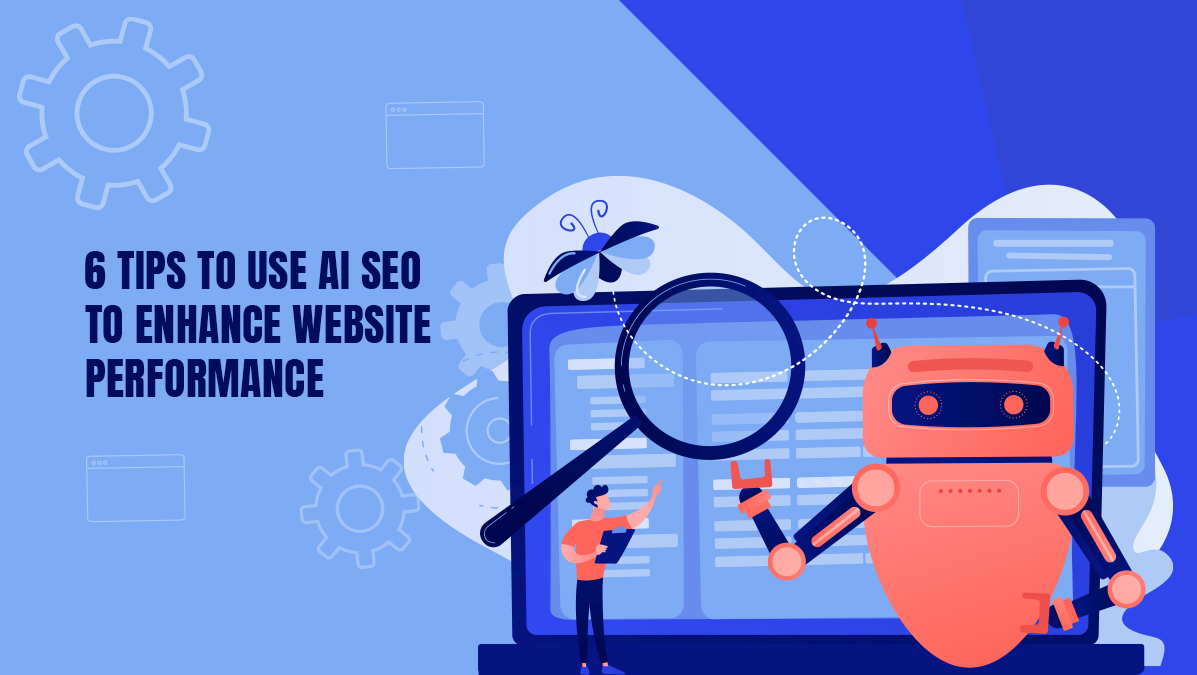The internet has become the primary resource for a wide range of information, from celebrity trivia to home repair solutions. However, the advent of AI SEO is revolutionizing the way marketers optimize their websites to achieve high rankings on search engine results pages (SERPs). Failing to achieve a prominent ranking can lead to a significant loss of valuable search traffic, resulting in decreased revenue for your business. In the past, basic SEO strategies were often sufficient to succeed.
However, the landscape has changed. As artificial intelligence (AI) continues to shape our world, it is essential to elevate your SEO approach.
So, what does this mean for your SEO strategy?
What is AI?
Artificial intelligence (AI) is a broad term encompassing various technologies, such as machine learning (ML), computer vision, natural language processing (NLP), deep learning, and other emerging fields.
The Purpose of AI
AI serves a primary objective: to outperform humans in cognitive tasks, particularly those that are repetitive or time-consuming. It is a technology designed to simplify our work and enhance our lives. AI has already demonstrated its effectiveness in boosting revenue within the business realm. In sales and marketing, approximately 30% of AI adopters reported a notable 6-10% increase in revenue after implementing this technology.
Even though AI can be beneficial to SEO, there’s a minuscule chance that AI will replace SEO.
Let us now discuss how AI is impacting SEO and why won’t it take over.
What is AI SEO?
AI SEO refers to the integration of artificial intelligence (AI) into search engine algorithms, including prominent ones like Google’s Rankbrain and BERT. Understanding AI and its influence on search engines is crucial for leveraging its power to enhance your SEO efforts.
However, AI offers much more than that. It serves as a valuable tool for data analysis, a vital aspect of developing an effective SEO strategy. With the assistance of AI-powered SEO software, you can accomplish tasks faster and more efficiently, such as identifying trending topics and identifying content gaps. AI and SEO are a perfect combination in the digital realm.
Why is AI SEO Important?
The collaboration of AI and SEO simplifies the process of improving your website’s rankings, despite the complexity associated with both disciplines. Search engines prioritize user satisfaction and strive to provide the most relevant content possible.
· Consequently, SEO has evolved beyond merely incorporating keywords.
It now focuses on:
· Concepts: Understanding the underlying idea behind search queries.
· Context: Identifying the intent behind search queries.
· Customer satisfaction: Offering the most pertinent answers to users’ queries.
Keyword stuffing is ineffective (and has been since the Hummingbird update by ‘Google’). To achieve higher rankings, you need a solid link-building strategy and optimization for AI-driven search engines. Presently, and in the future, user experience plays a pivotal role in ranking factors. AI stands as one of the best methods for delivering a positive browsing experience to website visitors.
6 Tips to Use AI SEO to Enhance Website Performance
Now that you have gained an understanding of AI and its impact on SEO, let’s explore several ways in which AI SEO can be utilized to align with modern SEO tactics effectively.
1. Uncovering Opportunities with AI SEO: An integral aspect of SEO involves identifying untapped ranking opportunities that have not yet been capitalized upon. This is an area where AI-powered SEO proves to be exceptionally valuable in elevating your website’s rankings.
Over the past few years, robust SEO tools driven by AI have emerged, providing deeper insights into:
· Targeted Keywords: AI SEO tools offer valuable recommendations on the keywords you should focus on for optimal results.
· Link Building Prospects: AI assists in identifying potential link building opportunities that can significantly impact your SEO endeavors.
Leveraging these and other insights obtained through AI-powered SEO software is essential for devising a content strategy that can exponentially enhance your website’s SEO performance. In the increasingly competitive race for higher rankings, it is crucial to uncover SEO opportunities that are not commonly exploited, including keywords, topic ideas, and other avenues.
By identifying untapped opportunities that your competitors have overlooked, you significantly improve your chances of ranking successfully. However, manually finding these opportunities demands substantial creativity, time, and effort.
Fortunately, with the assistance of AI-powered SEO software, you can swiftly uncover valuable SEO opportunities. This is a compelling reason why AI should be an integral part of your SEO strategy.
2. Content Creation with AI SEO: Discovering potential content opportunities is just the initial step in dominating the search engine results pages (SERPs). Creating content that precisely meets user expectations is equally crucial. This is where AI can enhance your SEO endeavors.
How does it work?
After utilizing SEO tools to identify target keywords, AI can guide you in determining the type of content to develop. By analyzing content already created around the keyword, AI-powered tools quickly identify:
· Content gaps that can be leveraged
· Trending topics of interest
· The optimal number of sections to include
Insights like these make it easier to craft personalized content that addresses specific user needs and intents, effectively solving their problems.
3. Content Optimization with AI SEO: For an extended period, content optimization has revolved around elements such as keywords, internal links, backlinks, and other on-page SEO techniques. Undeniably, these aspects continue to hold significance.
Nevertheless, search engines have expanded their evaluation criteria beyond these traditional indicators. They are becoming increasingly adept at discerning the precise intent of searchers during their queries.
So, how can you optimize your content to align with user intent? – with the assistance of AI.
AI SEO tools empower you to:
· Create topic clusters that comprehensively address user inquiries and achieve high rankings.
· Determine the optimal content length for your chosen topic.
· Effectively utilize keywords and latent semantic indexing (LSI) keywords.
By leveraging AI, you can optimize your content to adhere to Google’s E.A.T standards outlined in their search quality raters’ guidelines. This enables you to craft authoritative content that expertly addresses user queries – precisely the type of content that Google favors when serving its users.
However, the capabilities of AI extend beyond content optimization for search engines. AI-driven writing tools offer assistance in enhancing the readability of your writing. This not only contributes to a more enjoyable reading experience but also increases engagement time, a metric that signals to search engines the usefulness of your content.
In essence, AI enables you to produce well-optimized content that resonates with your readers and encourages engagement.
4. Voice Search Optimization: Voice search has emerged as one of the rapidly advancing realms of search technology. With an increasing number of individuals relying on voice-activated devices to browse the internet, voice SEO (VSEO) has become an indispensable component of an effective SEO strategy.
According to Statista, the projected global count of voice assistants is set to surpass 8.4 billion in the coming years, exceeding the world’s population. As most voice searches take the form of questions, one of the primary methods to optimize for VSEO is by providing comprehensive answers to the queries posed by users. This is precisely where AI tools prove invaluable. For instance, many tools enable you to develop VSEO – optimized content by presenting the specific questions users are asking.
Additionally, conversational aspects play a significant role in voice search. This is where AI principles such as Natural Language Processing (NLP) come into play. AI-powered content tools contribute to creating more conversational content by offering suggestions for tone adjustments and highlighting passages that may be difficult to comprehend.
It is important to note that VSEO is fiercely competitive. This is due to the fact that voice assistants provide only a single answer, typically the top result in the search engine results pages (SERPs).
Therefore, it is imperative to employ comprehensive strategies to secure a favorable ranking in VSEO.
5. Scale Your SEO: A significant aspect of search engine optimization (SEO) involves laborious manual tasks that have historically delayed marketers’ ability to achieve rapid results. Fortunately, AI has revolutionized the field.
AI-powered tools have alleviated much of the arduous work associated with SEO by efficiently gathering and analyzing data, subsequently translating it into actionable insights. Moreover, artificial intelligence SEO software extends its benefits to technical SEO as well.
For instance, it can facilitate website audits, automatically optimize content, and resolve issues related to duplicate content. In terms of on-page SEO, AI SEO software plays a pivotal role in content scaling by analyzing high-performing content. Leveraging this information, the software assists in crafting content strategies and enhancing optimized performance.
Consequently, you can rapidly expand your SEO endeavors without burdening your team excessively. AI effectively takes charge of the laborious, time-consuming, and sometimes demoralizing aspects of SEO, liberating your team to focus on other tasks that necessitate human attention.
6. User Experience: Keep in mind that Google and other search engines prioritize the user experience above all else. Therefore, user experience (UX) holds great significance in the field of SEO. In an unusual announcement, Google emphasized that page experience would become a major ranking factor starting in 2021.
But what exactly does page experience entail?
According to Google, page experience encompasses a set of indicators that gauge a user’s satisfaction or dissatisfaction while interacting with a web page. This evaluation extends beyond the mere provision of information and takes into account the overall UX delivered by the page. Naturally, pages offering a negative user experience will not rank well, while those providing a positive user experience will receive favorable treatment.
So, where does AI enter the equation?
As search engines increasingly emulate human users, they are better equipped to assess whether a webpage will deliver a positive UX.
Consequently, when a user enters a search query, search engines strive to ensure that the results comprise:
· Relevant and authoritative content
· Well-structured pages
· Pages with intuitive navigation
· Fast-loading pages
· Mobile-friendly websites
If your website offers users a personalized experience, it will lead to increased dwell time and content sharing. These behaviors serve as signals to search engines, indicating that your content deserves higher rankings on the search engine results pages (SERPs).
Modern AI-powered SEO tools have the capability to mimic search engines and provide recommendations on improving your website’s UX. By leveraging such tools, you no longer have to rely on guesswork to determine whether search engines will favor your website. Instead, you can gain insights into what pleases search engines to a greater extent and implement those strategies on your website.
In conclusion,
Unlock the future of SEO with artificial intelligence integration. Partner with 18th Digitech, a leading SEO company in India, for a robust strategy that captivates and retains audiences.









 About 18th Digitech
About 18th Digitech Awards and Credentials
Awards and Credentials Our Partners
Our Partners
